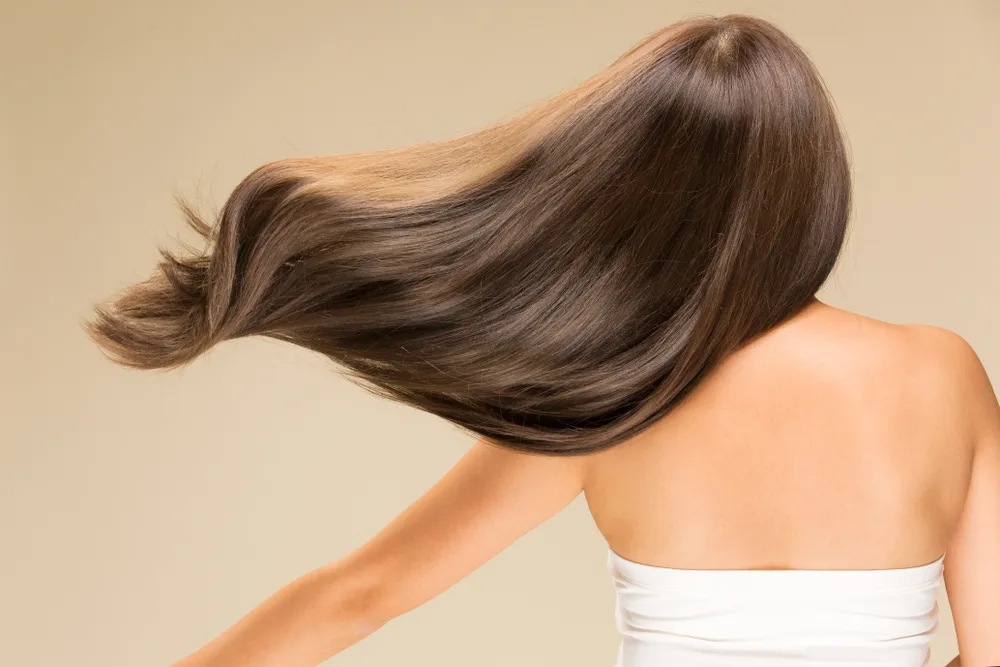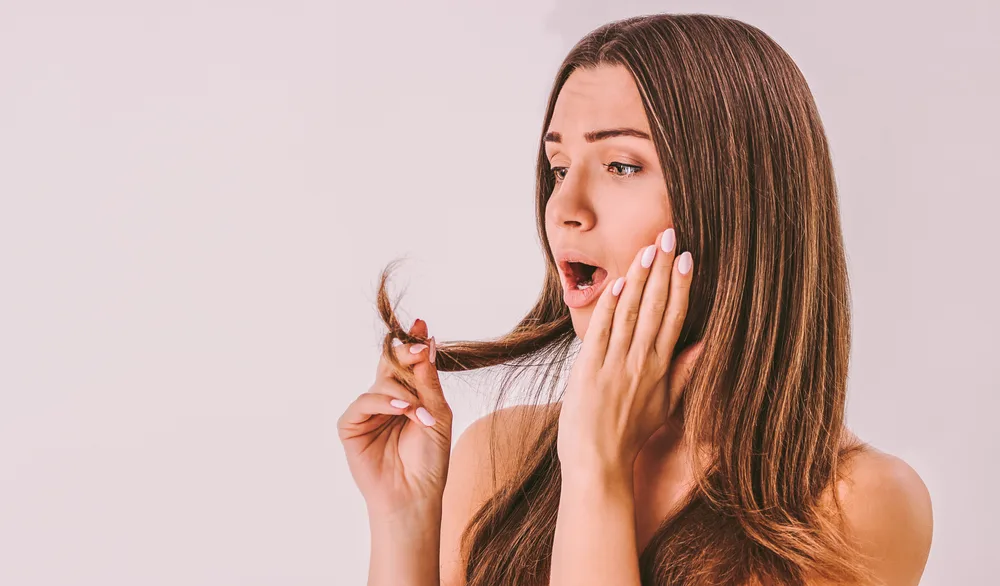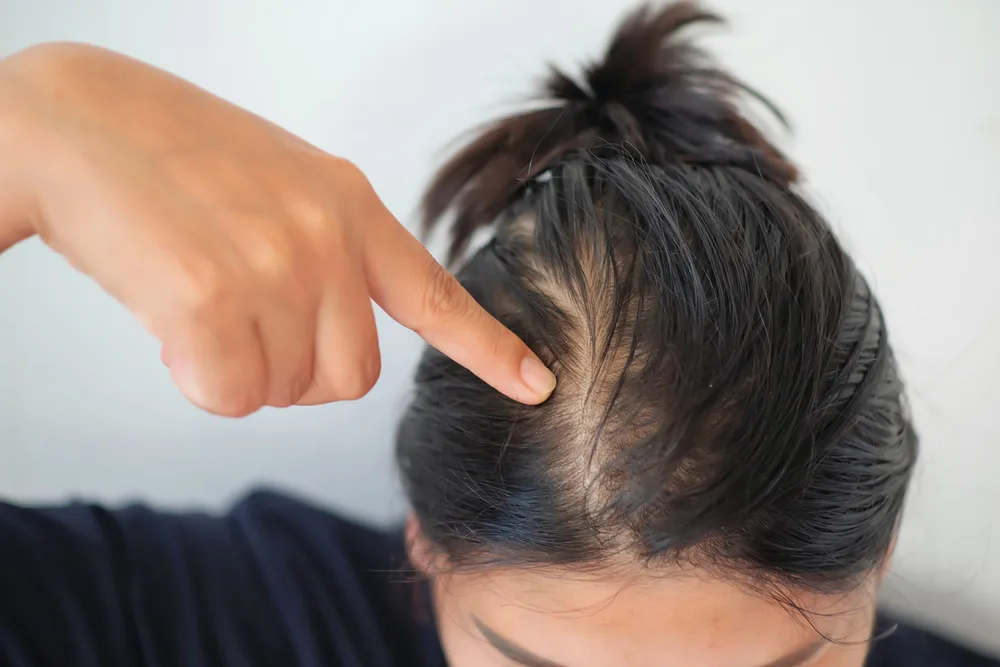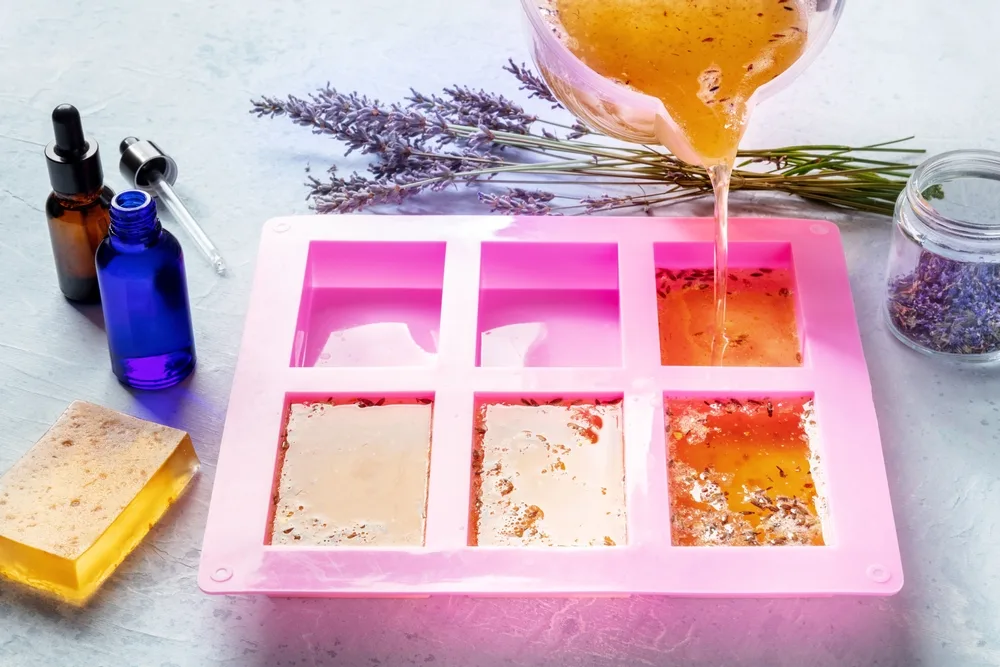Jump to:
Silicon-containing hair products have gotten a bad reputation in recent years as many people move to all-natural products in their hair care routines. But, are silicones bad for hair?
Are Silicones Bad for Hair?
Yes and no. Silicones don’t directly cause damage to your hair or scalp. But while they give your hair a waterproof coating that adds shine, reduces frizz, and protects it from heat damage, product build-up on your hair eventually causes more dryness and can lead to breakage.
Silicone is a polymer added to hair products to provide deep conditioning and detangling effects. They are common to hair products because they add moisture to the hair, making it look sleek and shiny.
Polymers are chemical compounds made up of small molecules arranged in repeating structures. There are natural and synthetic polymers, however, the ones found in styling products, shampoos and conditioners are the synthetic kinds.
Synthetic silicone polymers derive from crystal quartz. These rubber-like compounds coat your hair strands to lock in moisture, add shine, and control frizz.
There are three types of silicones added to hair products:
- Water-soluble
- Non-soluble
- Evaporating (Volatile)
Water-soluble silicones dissolve in plain water, so they rinse out when you wash your hair. Non-soluble silicones don’t dissolve in water. They usually require sulfates found in many shampoos to get them out. Volatile silicones evaporate between 10 minutes and two hours after you apply the product.
Positive Effects of Silicones

kei907/Shutterstock
It’s a personal choice whether to boot them out of your hair care routine. Despite the negative press, they have some positive effects if you know how to use them for maximum benefit.
The silicone’s job is to coat your strands with a waterproof layer to lock moisture inside and keep humidity out. This gives your hair shine and reduces frizz.
The sleek coating also helps detangle your hair. Silicones can protect your hair from heat damage caused by styling tools like blow dryers, curling irons, and straighteners.
Pros
- Hydrates hair
- Reduces frizz
- Detangles
- Protects from heat damage
Negative Effects of Silicones

Anna Truhub/Shutterstock
While silicones lock moisture into your strands, the protective coating they form keeps out other substances that could be beneficial. Adding leave-in conditioners or nutrient-rich hair oils to your strands after using a heavy silicone product won’t do any good.
They won’t penetrate the silicone barrier. Most silicones aren’t water-soluble. That means they don’t break down and rinse out of your hair easily whenever you wash.
Stronger silicones require you to use a clarifying shampoo, perhaps more than once, to remove them from your hair. Using sulfate shampoo is a whole other hair conversation. When you don’t regularly clarify your hair, products build up making your hair look dull.
Your hair also gets weaker and is prone to breakage with product build-up. Using silicones doesn’t directly damage your hair. But leaving silicone products on without a clarifying wash leads to negative effects on your hair.
The waterproof barrier formed by silicones reduces moisture in your hair over time. Eventually, you can have breakage if you don’t use silicone-containing products correctly.
Cons
- Require sulfates to wash out
- Product build-up
- Dehydrate strands over time
Hair Types That Benefit From Silicones
Most normal hair types benefit from silicone-containing products. They can reap the immediate benefits mentioned above and easily mitigate any downsides.
- Medium Porosity Hair
- High Porosity Hair
- Straight or Wavy Hair
Medium to High Porosity Hair
Porosity means how easily your strands absorb moisture. The outermost layer of your hair strands is called the cuticle. In medium to high porosity hair, the cuticle is moderately or wide open allowing the strand to absorb moisture easily.
Medium to high porosity is great for adding moisture to your hair. Unfortunately, this type of hair doesn’t hold onto hydration.
Moisture quickly evaporates from hair with medium or high porosity. The protective coating provided by silicone helps seal in hydration and reduces frizz by sealing out environmental moisture like humidity.
Straight or Wavy Hair
Your hair sits along a spectrum of textures from pin straight to coils. Hair types in the middle tend to tolerate regular use of silicones, even heavy ones. Even so, use a clarifying shampoo about once a week to keep away product buildup.
Read Next: Determine your hair type by taking our hair type quiz!
Hair Types to Avoid Silicones

Alon Za/Shutterstock
As with any hair regime, which products you choose depends heavily on your hair type and goals. Some specific hair types can benefit from using only light silicones or avoiding them completely.
- Thin Hair
- Fine Hair
- Curly Hair
- Low-Porosity Hair
Thin or Fine Hair
Thin hair tends to get weighed down by products with heavy silicones or products with higher percentages of silicones. Thin hair can look limp and dull, and product build-up happens quickly.
If you have thin or fine hair, use products with soluble or evaporating silicones to keep the negative effects at bay.
Curly Hair
The introduction of the Curly Girl Method of hair care is one source of the campaign against silicones. Curly hair tends to be dry since the natural oils and sebum can’t travel down the hair shaft quickly enough to moisturize it.
The drying effects of silicones compounded with sulfates in shampoos make curly hair even drier. Heavy silicones may also weigh down your curls, elongating them.
Low Porosity Hair
Low-porosity hair has a closed cuticle, keeping moisture out. The negative effects of silicones compound overall dryness in this hair type. You may desire to avoid non-soluble silicones as part of your hair care routine. Cutting out silicones altogether is easier said than done, however.
Extremes on the Texture Spectrum
Curly and wavy hair tends to be on the coarse side of the texture spectrum, so silicone protocols apply. However, you may have straight hair with low porosity and coarse texture.
Consider the extremes of the texture spectrum. If you have very coarse or fine hair, non-soluble silicones will have negative effects faster than hair in the middle.
How to Tell If a Product Contains Silicone

Wavebreakmedia/Shutterstock
Many hair product companies have caught on to the anti-silicone trend in the market. You’ll see a label claiming a shampoo or conditioner is silicone-free, but you must read the ingredients to be sure.
These products usually contain lightweight silicones that don’t have as much negative effect on your hair. But if you want to be purely silicone free, make sure it has no ingredients ending with -cone.
A few heavy silicones in hair products are:
- Cetearyl methicone
- Cetyl dimethicone
- Dimethicone
- Dimethiconol
- Stearyl dimethicone
Some water-soluble silicones are:
- Amodimethicone
- Cyclomethicone/Cyclopentasiloxane
- Trimethylsilylamodimethicone
The chief offender is the non-soluble dimethicone. The build-up of products containing dimethicone can clog your pores and follicles leading to itching and flaking.
Alternatives to Silicones
The market has responded to the demand for silicone-free hair care products with some natural alternatives. They provide hydration, add slip, and reduce frizz. Check the label for these types of ingredients.
- Coconut fatty acids
- Shea butter
- Bamboo extract
- Castor oil
Frequently Asked Questions

Plateresca/Shutterstock
Navigating hair care can sometimes make you feel like you need a chemistry or cosmetology degree. Are silicones bad for hair? Here are a few more answers.
Is silicone dangerous?
No. Silicone is a man-made substance, but it isn’t toxic. It won’t harm your health to use products that contain silicones. However, over time, non-soluble silicones like dimethicone can build up on your scalp and irritate your scalp. Using a clarifying shampoo prevents product buildup. You have to weigh the positive and negative effects on your hair.
Are polymers plastic?
No. While plastic is a specific type of polymer, that doesn’t mean that all polymers are plastic. The types of synthetic polymers in hair products aren’t the same as those used to make plastic products.
Are silicones or sulfates worse for hair?
Non-soluble silicones usually require a harsh cleanser to remove. Sulfates are an ingredient in many shampoos. They strip the hair of natural oils and proteins, which can cause dryness and breakage. Many people get caught in a cycle of silicone buildup, harsh sulfate cleanses, and repeat. If you avoid heavy silicones, you can use a sulfate-free shampoo.
Are silicone-free shampoos better?
That depends on your hair texture and the routine you want to establish. If you are avoiding silicones, you probably don’t want to compound their use across multiple products. Say you have soluble silicone in your conditioner, then you might want to use a silicone-free shampoo.
Do silicones cause hair loss?
No, silicones don’t directly cause hair loss. Dermatologists may recommend avoiding hair products with silicones, especially non-soluble silicones if you are experiencing hair loss already. Product buildup can clog follicles and exacerbate the problem. You also wouldn’t want to get stuck in the silicone and sulfate wash cycle if you are concerned about hair loss.
So, Are Silicones Bad for Hair?
Silicones aren’t inherently bad. They can provide hydration, protection from heat, and removal of frizz and entanglement of your hair. Even with all these benefits, they can also have side effects over time. But while they’re not always bad, we tend to recommend avoiding them as much as possible.
